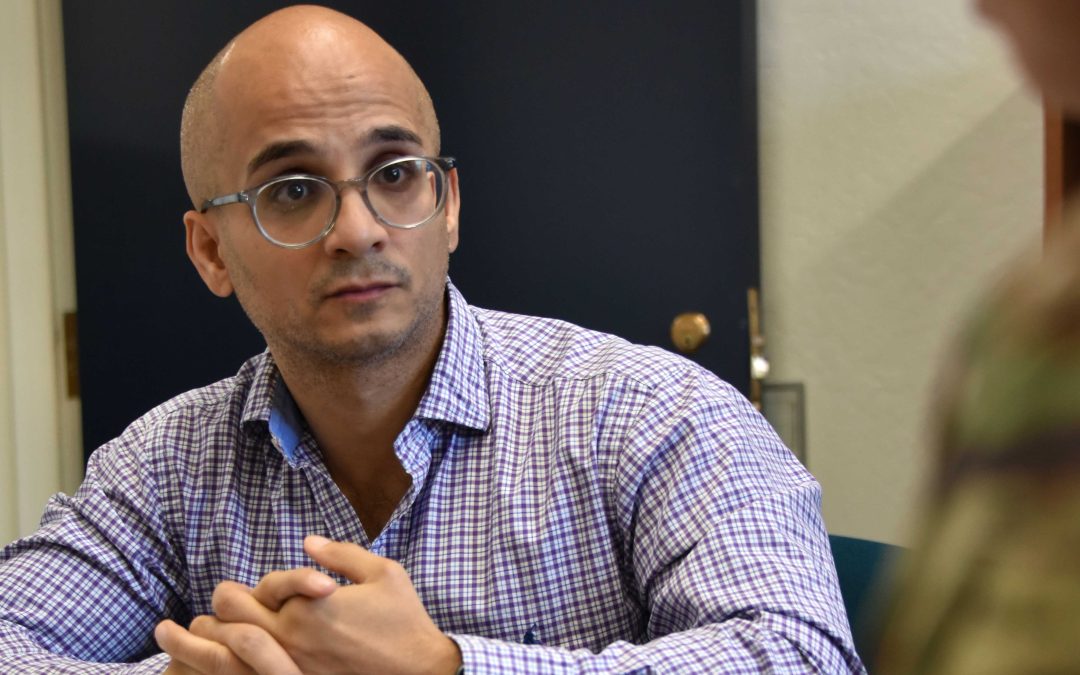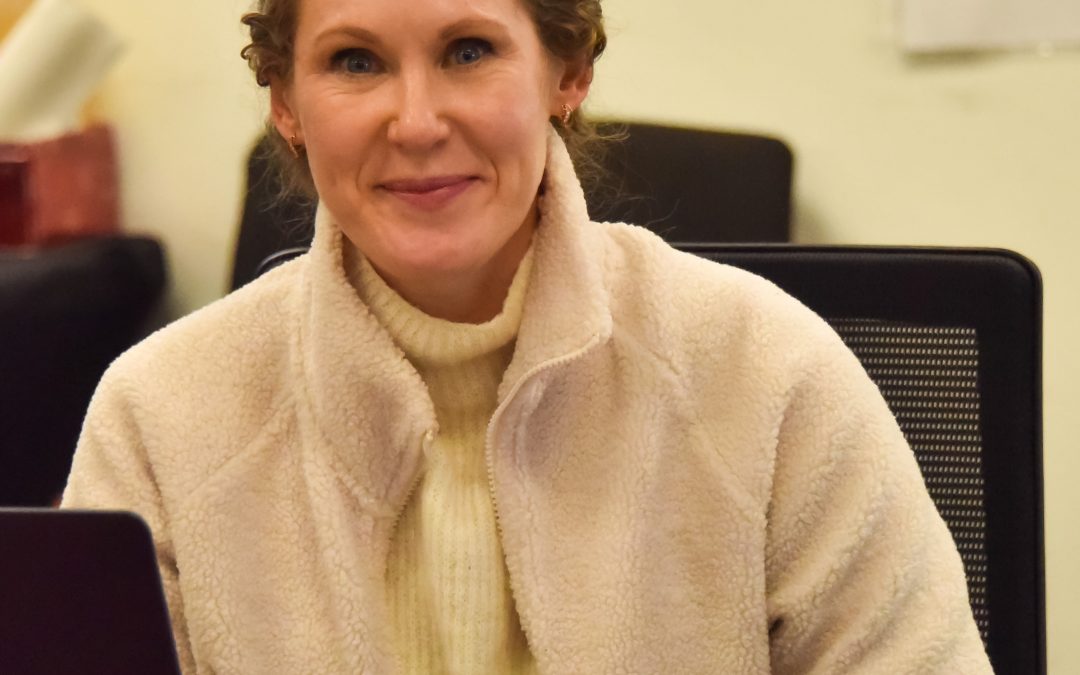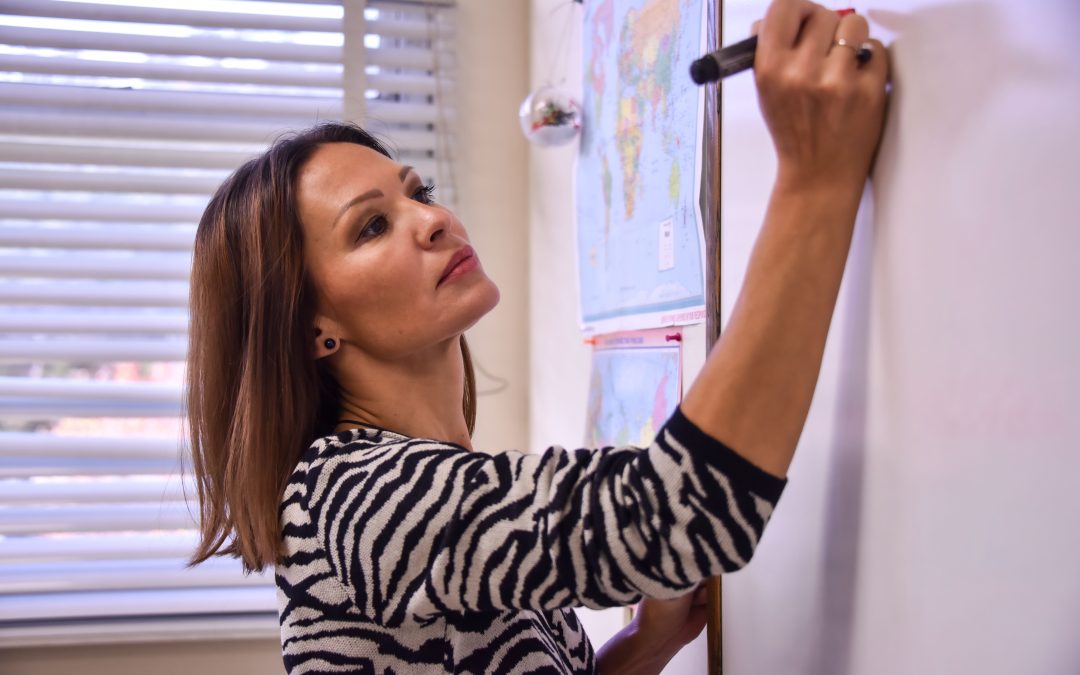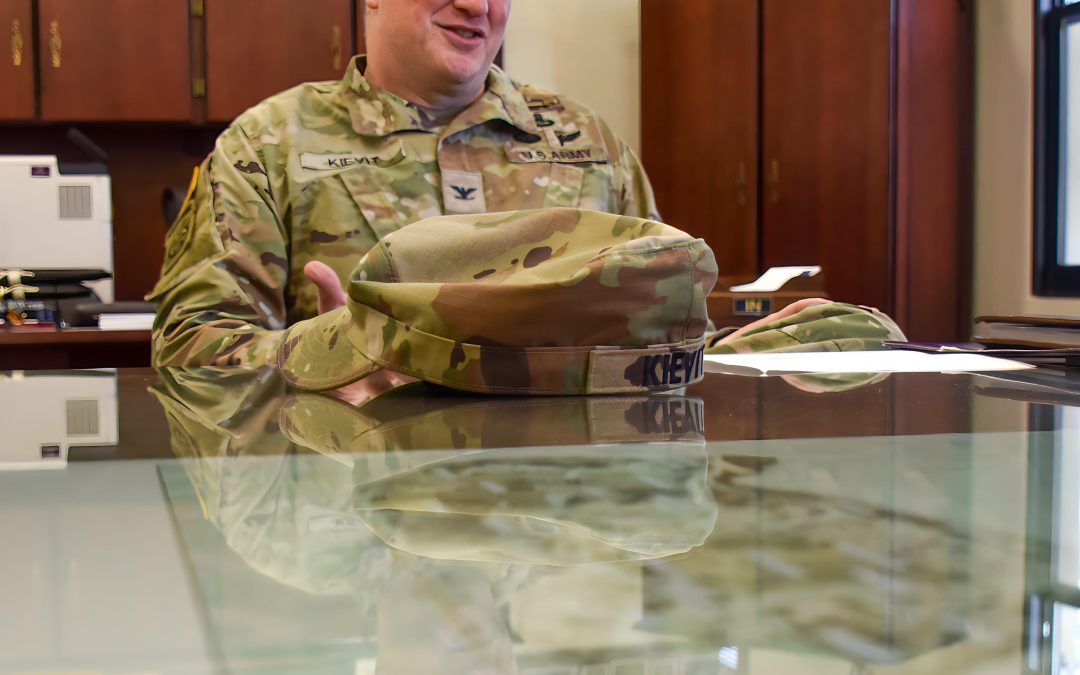By Patrick Bray
DLIFLC Public Affairs

Zhijian “Kevin” Yang is a Mandarin Chinese teacher at the Defense Language Institute Foreign Language Center’s Asian School I. Yang grew up during China’s Cultural Revolution in the mid 1960’s to the mid 1970’s in Hohhot, the capital city of China’s Inner Mongolia Autonomous Region. (Photo by Patrick Bray, DLIFLC Public Affairs)
MONTEREY, Calif. – Zhijian “Kevin” Yang has been teaching at the Defense Language Institute Foreign Language Center’s Asian School I since 2007, but his story begins during the days of China’s Cultural Revolution in the mid 1960’s, in Hohhot, the capital city of China’s Inner Mongolia Autonomous Region.
“It was very cold and there were not many trees,” Yang said, with a laugh as he recalled his childhood days in Hohhot. “It was almost desert-like, but we lived in the city so it wasn’t what a lot of people think of Mongolia – herdsmen, cattle, and horses.”
Yang grew up in a bicultural, bilingual family with his father being ethnic Mongolian and his mother a Han Chinese. As such, they were given a choice of which school to attend. The family chose the more beneficial option, which was the Mandarin school, as opposed to the Mongolian school. As a result, Yang speaks only Chinese.
Both of Yang’s parents worked. His mother was a doctor of internal medicine and his father was employed by the government as a public prosecutor.
“In America, people think that we must have had a lot of money with a lawyer dad and doctor mother, but that was not always the case,” said Yang. “It wasn’t a luxurious life but it was a decent life.”
One of the most difficult times for Yang, when he was about 15 to 16 years old, was when his father was placed under house arrest for more than a year at his workplace during the Cultural Revolution that took place from 1966 to 1975. Yang’s father was eventually exonerated and received an apology from the Chinese government in 1976.
Because of this, Yang developed a habit of listening to the radio.

Zhijian “Kevin” Yang is pictured here on the grasslands of China’s Inner Mongolia Autonomous Region. Today, Yang is a Mandarin Chinese teacher at the Defense Language Institute Foreign Language Center’s Asian School I. (Photo courtesy of Zhijian “Kevin” Yang)
“Some stations out of Hong Kong were saying things different from what Chinese stations were saying,” said Yang. “One station I listened to all the way up through university was the Voice of America.”
A few years following the Cultural Revolution, Yang began at Inner Mongolia University as an English major in 1978 where he became even more of a freethinker.
Some of the Voice of America programs taught English. One day he even sent a letter requesting a free textbook, but did not have high hopes of receiving anything.
“About two months later the Chinese Communist Party secretary in my department called me to her office. There were these books on her desk wrapped in brown paper with the corner torn open and Hong Kong stamps on it. I then got the idea why she called me,” said Yang. “I had to confess, telling her what had happened. I just wanted to learn English. That’s all and it was free.”
Yang received a warning but was allowed to keep the books. This experience emboldened Yang and he started ordering anything he could from the radio. He ordered a Bible because he thought it would be a great English-study resource.
“This time I got in big trouble because according to the Chinese the Bible is considered religious propaganda,” said Yang. “The Bible was confiscated at the post office and all that arrived was a letter to my department head.”
For this, Yang received an on-record disciplinary letter from the party.
Yang served as an interpreter at a travel agency without pay during his summers while at the university.
“One day there was this wonderful fellow about my size and he gave me a pair of blue jeans. There were no blue jeans in China at that time, but I so wanted to have a pair. He gave a pair to me and they fit,” said Yang.
The next day, Yang wore the blue jeans to class.
“You should have seen the expression on the face of the party secretary,” said Yang with a laugh. “Chinese didn’t wear clothes that tight at that time. She ordered me to go home and change.”
“I guess you could say I liked to push the envelope,” said Yang.
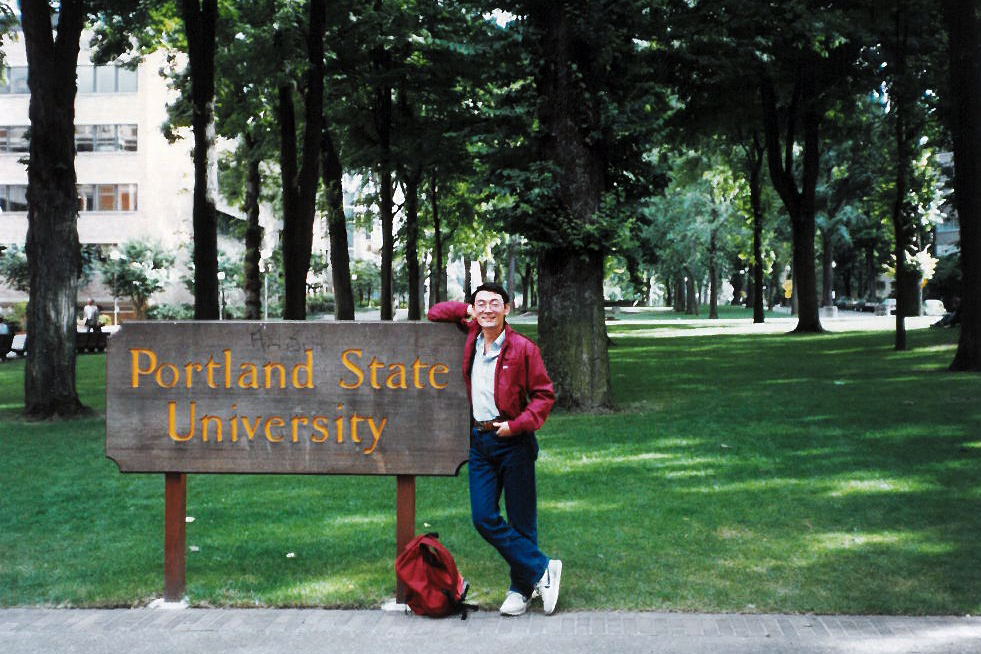
In 1985, Zhijian “Kevin” Yang began studying in the U.S. at Portland State University. About 20 years later he would come to the Defense Language Institute Foreign Language Center as a Mandarin Chinese teacher. (Photo courtesy of Zhijian “Kevin” Yang)
Despite his rebelliousness in the eyes of the Chinese Communist Party, Yang would be allowed to go to the U.S. to study. Several of his teachers were either from the U.S. or Canada and he met many English speakers when he worked as an interpreter. There were also many exchange students on campus who he befriended.
“My determination formed when I was in college studying English,” said Yang. “I learned so much about the U.S. without having been there.”
A professor from Portland State University arranged a one-year scholarship for Yang to study speech communication in Oregon in 1985.
“It was not easy to get out of China at that time. I first tried in 1982 and everything was ready to go, but because my tuition to Inner Mongolia University was all paid for by the government I had to follow their arrangements.”
Yang’s application to travel to the U.S. was denied and he was sent to an agricultural university to teach for three years. After that three-year period he still wanted to travel to the U.S. and had to persuade the agricultural university to let him go.
The government was also suspicious because Yang was not a government-arranged exchange scholar. He was someone who arranged his study completely on his own. They even took away his passport in order to keep him in China.
“I told them that I studied English. I will never have this opportunity again, but they said that my English was already good enough, that I didn’t need more training,” said Yang.
Yang eventually won his case through determination and the fulfilling of his obligation to the agricultural university. He enrolled at Portland State University and began a new life in the U.S. in 1985. When his scholarship ran out he took jobs in translation and interpretation to continue to support his studies.
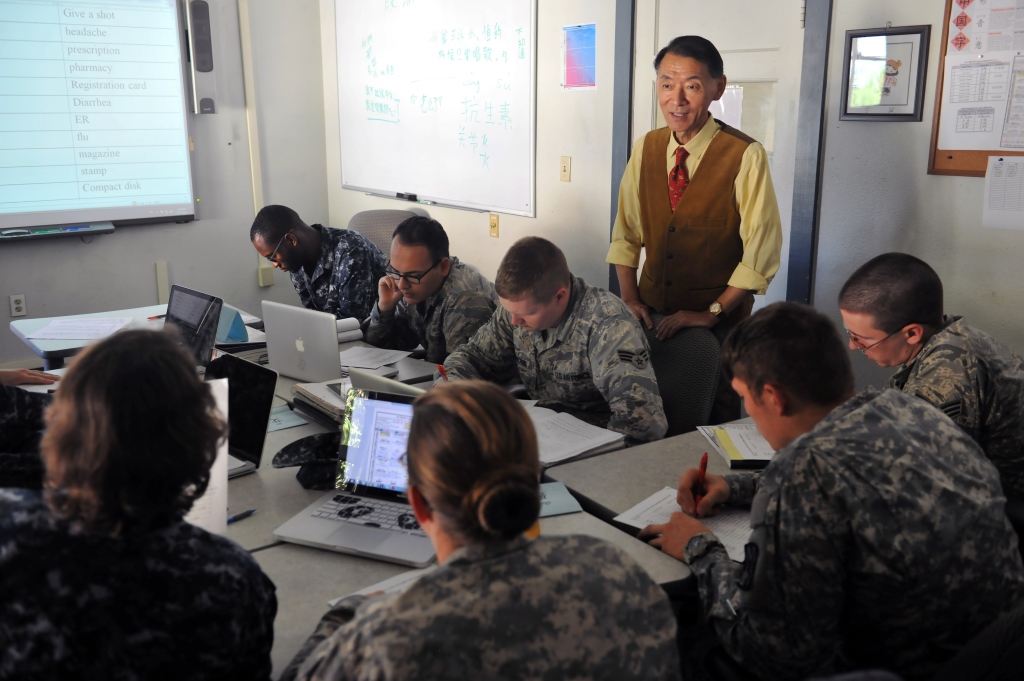
Zhijian “Kevin” Yang interacts with his Mandarin Chinese students at the Defense Language Institute Foreign Language Center’s Asian School I. (Photo by Patrick Bray, DLIFLC Public Affairs)
“By doing this I realized that translation is a good business here. I was so enthusiastic about my future,” said Yang, who decided to teach and do translation fulltime after graduation rather than return to China.
“One day my former classmate from Inner Mongolia University called me and said she got a job at the Defense Language Institute. She said they still needed a teacher and that I should apply too,” said Yang. “She said that it’s so cool to teach these young American service members Chinese.”
After a few days he submitted his application and was hired within a few months.
“This is the best job I’ve ever had. After all the jobs I’ve had, I like teaching Chinese the best. My students tell me I’m a natural teacher,” said Yang. “The rewarding part of this job is I see these bright young people come here with zero knowledge of the language and through our teamwork 64 weeks later we are able to see them flourish in Chinese. I enjoy being part of this.”

